Sara Jayne Townsend's Blog, page 43
November 30, 2011
To Pay Or Not To Pay
(Cross-posted on the WriteClub blog)
"Money flows towards the author." This was a mantra I learned fairly early on in my writing career. If a publisher charges you money to publish your book, it's a scam, I was told by several reliable sources.
Sound advice, but there is an additional factor these days that complicates matters: when is it OK to pay for marketing?
I was always led to believe that an author should not have to shell out for marketing their own book. A reputable publishing company will have a marketing department, and if they are investing in you as a writer, they should be promoting your book. Sadly, the world is changing. Only the big publishing companies these days seem to be prepared to spend money on marketing. Many of the small independents do not employ a marketing person or PR department. And even if you are with a publishing company who do, gone are the days when the author could hide in her garrett and expect all the work to be done on her behalf. She has to be Out There, pimping herself and her books at every opportunity.
E-books become even more problematic, as with a print book you have something to physically hold and try to sell. If you have a print book, you can contact book stores and set up signing sessions. With an e-book, all you can do is pimp your link around the Internet. And although there are a lot of online resources that will let you do this free of charge – Goodreads, Facebook, LinkedIn, Twitter, a personal website, a blog, etc – is this really enough?
My sales to date suggest it's not. I have signed up for all the above. I blog at least twice a week. I Tweet daily. I post links about my e-books on Goodreads, Facebook, and a host of other Internet sites. I am forever scouring the Internet for online review sites, anyone looking for guest bloggers – anything that I can use to promote my books. And yet my sales can be described as modest, at best. My total income to date from royalties for both published novels, since SUFFER THE CHILDREN was published over 18 months ago, is half of what I earn in a week at the day job.
The question is, then, what else can I do? There are plenty of other promotional opportunities out there, if you are willing to pay for them. Ads in magazines, or on websites. Internet sites that will give you reviews and set you up on blog tours, as long as you are willing to pay for the service. But this goes against that all-important mantra, and hence the dilemma: should I be paying to promote my e-books?
I did, after all, fork out for marketing when I paid for the postcards, business cards and promotional material that I used to promote each of my two books when they first came out. I still have a pile of postcards left – I take them along to all the conventions I go to, leaving piles of them on the 'free stuff' tables and handing out the cards at every opportunity. But to date, I haven't paid for any other advertising.
Now I'm starting to wonder if I should be. It's a gamble, of course. There's no guarantee that paying for advertising will help sales in any way. And there's no way of telling if the advertising opportunities on the Internet come from people who really know what they are doing, or whether they are just scams run by people playing on the desire of authors to get their books Out There.
I'm still pondering over this dilemma. If you are a published author who has paid for advertising, I would be interested in hearing your views – whether the advertising was worth the money, or not. Because I'm not much of a gambler. I'd rather make an informed decision after researching the facts.

November 28, 2011
My Life In Books: James and the Giant Peach
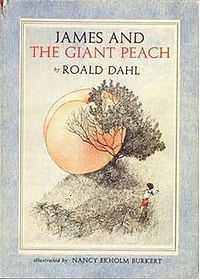 I think all children should read Roald Dahl. His children's books are entertaining, imaginative and just a touch dark. It's an ideal combination.
I think all children should read Roald Dahl. His children's books are entertaining, imaginative and just a touch dark. It's an ideal combination.
I confess I haven't read them all. The first one I encountered was JAMES AND THE GIANT PEACH and it was read to the class by my teacher in junior school. I think I was about seven years old.
Roald Dahl was fond of making orphans out of his main characters by having their parents meet horrendously violent deaths. Young James is orphaned when his parents are eaten by a rampaging escaped rhino, and he is sent to live with his two ghastly aunts, who turn him into a slave, beat him for no reason and make him sleep on the floor in the attic. Then James meets a strange old man who gives him a sack of crocodile tongues and turns his life around. While carrying the sack home, James trips over a tree root and the crocodile tongues spill into the tree roots. The following day an enormous peach appears on the tree, that keeps on growing until it breaks free and rolls away, squashing the two ghastly aunts flat on the way. James ends up inside the peach with a group of six-foot tall insects, and they all have a fantastic adventure.
I like the way Dahl pulls no punches when it comes to exposing children to the harsh unpleasantries of life – death; violence; and so on. And yet there is a justice to the darkness: everyone who is a nasty person gets their just desserts in the end, and the courageous young protagonist who has endured much tragedy and hardship ends up in a much better place by the end. All James wants is friends, something his aunts denied him by not letting him meet other children. At the end of the novel, James lives out the rest of his life in the hollowed-out peach stone in Central Park, and the world famous status he has earned because of his adventures allows him to have all the friends he wants.
I wonder if Dahl would get away these days with writing such violent books for children. Apparently JAMES AND THE GIANT PEACH has had its share of critics over the years: according to Wikipedia, it is #56 on the American Library Association's list of books most frequently threatened with censorship.
Children haven't changed all that much – they are often more resilient than people think – but society has, and seems to feel the need to shield them from everything nasty and unpleasant in the world. Apparently in the 1996 film version of this book – which I haven't seen – James's ghastly aunts are not killed by the peach, but instead chase him all over New York before being taken away by the police. Somehow, this seems an unsatisfactory ending. As a seven-year-old I was rather pleased that the ghastly Aunt Sponge and Aunt Spiker met an unpleasant death. After all the horrid things they did to make James's life so miserable, I would have felt that merely being arrested was not punishment enough.
I have a memory of a 1970s musical adaptation of JAMES AND THE GIANT PEACH on British TV, featuring Bernard Cribbins – more recently known as Donna Noble's grandfather in 'Dr Who', but in those days he was a well known children's TV presenter – as the centipede. But an Internet search has produced no reference to it. I'm fairly sure I didn't imagine it. I remember the two ghastly aunts being squashed flat by the peach, and ended up as cardboard cut-outs. Death was acceptable for kids in those days. Excessive gore was not.
Happily, Roald Dahl's books are still in print and still being read by kids today. As long as they are, there's still hope for the next generation.

November 25, 2011
Buy My Books
Today is, apparently, Black Friday – the day after Thanksgiving. Not being American, this means nothing to me. However, as Black Friday appears to be the day all the sales start, I think it's akin to Boxing Day for we Brits – and both days come the day after a major family feast day.
Anyway, what's important is the fact that Lyrical Press are having a Black Friday sale – 50% off all their titles. I don't often resort to hard-core sales techniques, but today I am unashamedly telling you to go and buy my books.
If you have already, then I thank you – it is greatly appreciated. Maybe you've got a friend who's recently acquired an e-reader? If so, perhaps you can send the links their way and persuade them to invest in some new titles for their new device.
If you haven't bought my books yet, however, then today is a good day to do it, because today they will cost you a mere $2.75 each. That's about £1.50, in Brit money. That's less than you pay for a cup of coffee in London, and the book will give you pleasure for longer than the coffee will.
Both e-books are available in all formats, compatible with any e-reader. And if you haven't got an e-reader, you can download the PDF version, to read on your computer.
If for some reason you haven't got a PDF reader (though it is free), then download the Kindle reader, available for PC, Mac, iPad, and Smartphone free of charge – click here for link.
Buy SUFFER THE CHILDREN here, and DEATH SCENE here. Available at this marvellous price for the rest of today.
Go do it now and help my sales. I'm still a very long way down the bottom of that ladder to fame and fortune. Maybe you can help me reach the next rung.

November 23, 2011
A Million Books
(Cross-posted on the WriteClub blog)

The new Kobo e-reader
The Kobo has hit the UK. My husband caught me perusing these the other day. "We've already got two e-readers," he said sternly. "We don't need another one". I guess he's got a point. The Kobo looks like a cross between the iPad and the Kindle, and it takes ePub format e-books – the same as my Sony e-reader.
One of the selling points of the Kobo is that there are a million free e-books available for it. I got to thinking about that. A million books. That's a lot of books. Just how long would it take to read all those books? I read, on average, a book a week. At that rate it would take over 19,000 years to read a million books. Even if one were to read a book a day – possible if one didn't have to go to work or leave the house at all – it would still take over 2,700 years to read a million books.
Of course, it's doubtful that all of those free e-books are worth reading. But even if you only want to read a fraction of them, it's entirely possible to buy a Kobo and have enough reading material on it to last the rest of your life without having to buy another book.
That's not the way it would work, of course. Every time you perused the online e-book store, you'd find plenty of books you wanted to buy and read. And you will buy them, because once you realise how easy it is to buy e-books, and how convenient e-books are to carry around, you'll be converted.
That, my friends, is how e-books suck you in.

November 21, 2011
My Life In Books: Milly Molly Mandy
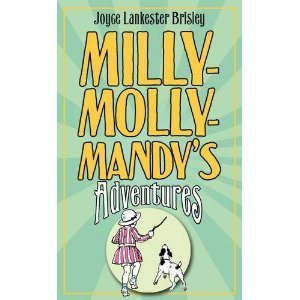 Joyce Lankester Brisley's books about the little girl who lives in the white cottage with the thatched roof first appeared in the 1920s, and the enchanting illustrations are testament to the fashions of the era. There's a nostalgic charm to the books that captured my imagination when I was a little girl.
Joyce Lankester Brisley's books about the little girl who lives in the white cottage with the thatched roof first appeared in the 1920s, and the enchanting illustrations are testament to the fashions of the era. There's a nostalgic charm to the books that captured my imagination when I was a little girl.
Milly Molly Mandy lives with six grown-ups – Mother, Father, Aunty, Uncle, Grandma and Grandad, and her playmates are 'Little Friend Susan' and Billy Blunt, the blacksmith's son. She always wears dresses with pink and white stripes. She is an ordinary little girl with an ordinary life in a small English village. Part of the charm of these stories lies in their simplicity, and I'm sure Milly Molly Mandy enthralls today's little girls just as she did for my generation of little girls, and for generations before that, too.








November 18, 2011
Serial Killers
I am fond of a nice gruesome murder. A serial killer novel is right up my alley. However, I've read rather a lot of such books this year, and they are starting to become a tad formulaic.
A lot of these books have followed the same generic plot. The killer, generally male, is targetting a specific type of victim (generally female). As the body count piles up the police investigation gets ever more frantic. Meanwhile the reader gets to know the killer quite well, as parts of the story are told from his point of view. He relishes the thrill of the hunt, and gets turned on by the power he wields over his victims.
We know his motivations, what kind of vehicle he drives, how he catches his victims. What we don't know is his name. This is generally revealed about three quarters in, when something rings warning bells with one of the main characters. Further investigation reveals this person fits the killer's profile. The police set off in pursuit, and eventually the killer is caught.
The excitement in such novels is the thrill of the chase. Generally a character we've come to know and love becomes the target of the killer, and the suspense comes in whether he will be caught before he kills her.
I've probably read too many of such books in quick succession, but it's all getting a bit predictable. Suddenly I'm hankering after different fare in my reading diet.
The number of print books in my TBR pile is vast, as I've been abandoning such books for electronic ones of late. Top of the list is "Changes" by Jim Butcher, and my signed personalised copy of Sara Paretsky's "Body Work". Both of these books I've been looking forward to reading for months. The problem is, they're both hardbacks, which I find rather inconvenient to lug about with me on my daily commute.
There are other books in the pile, too, which I have acquired free of charge from attending various Cons this year. Sometimes these free giveaways are books not really worth reading, but there's often some hidden gems in there too.
As I get further into the new horror WIP, I find myself craving more horror. Once upon a time the only horror writers to be found on the shelves in British book shops were Stephen King, James Herbert and Clive Barker. Nowadays, it's a bit different. Horror seems to be back in vogue. Which means there must be a lot more horror writers out there for me to discover.
I'm looking to load up my e-reader with some good scary horror novels. All suggestions considered…








November 15, 2011
My Life In Books: Jennifer, Hecate, Macbeth, William McKinley and Me, Elizabeth
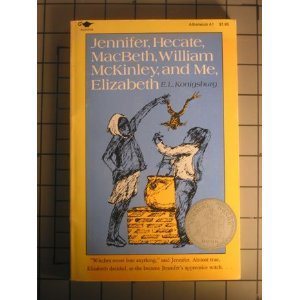 I found this book in the school library when I was about 7 or 8, and I liked it so much I looked for it again later on. It's one of the few books in this list I've read several times without ever actually owning.
I found this book in the school library when I was about 7 or 8, and I liked it so much I looked for it again later on. It's one of the few books in this list I've read several times without ever actually owning.
I liked it because I identified with the main character Elizabeth. Short for her age and teased by her classmates, Elizabeth finds a kindred spirit in Jennifer, an odd loner who claims to be a witch. Despite the title it's not actually a book about witchcraft – it's a book about being lonely and being the 'odd one out'. Although Jennifer and Elizabeth try out spells none of them actually work.
In the end it's about two lonely young girls who find companionship in each other. It's because of this theme that this book made such an impression on me as a child. Loneliness and isolation have been recurring themes in my own writing, as well as themes that resonated with me in books.
Unlike most of of images that have been accompanying this series of posts, where I could only find the current cover, the cover shot I include here is from the edition I actually remember reading, in the 1970s.
If you have a lonely, book-loving little girl in your life, she'll enjoy this story, if you can get your hands on a copy. One of the most important lessons in life is that it's OK to be different, and this story relays that message in an eloquent way – even if I didn't actually understand that's what I was getting from it at the time.








November 12, 2011
My Life in Books: Pippi Longstocking
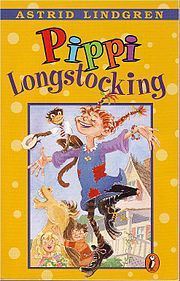 Long before Swedish crime writers became the Hot New Thing, Astrid Lindgren was enthralling children with her tales of the unconventional Pippi Longstocking, with her gravity-defying flame red plaits and quirky dress sense.
Long before Swedish crime writers became the Hot New Thing, Astrid Lindgren was enthralling children with her tales of the unconventional Pippi Longstocking, with her gravity-defying flame red plaits and quirky dress sense.
I think I must have been about six when I first discovered these books, and I loved Pippi's independent spirit and strong-willed nature. Thus it would seem that my fondness for strong and unconventional women began early in life.
As with The Famous Five, I think part of Pippi's appeal is that she lived a life free of parental restraints – she lived on her own and did whatever she wanted. Stories about children with that kind of freedom hold a universal appeal that's still relevant, and the fact that these books are still in print leads me to believe that Pippi's adventures are enjoyed by today's children.








November 9, 2011
"What If…?"
(Cross-posted on the WriteClub blog)
I have a reputation of being a worrier. I fret constantly about what might happen, no matter how unlikely. I leave the house in the morning with thoughts in my head along the lines of, "what if I left the hair straighteners plugged in?" (even though I checked twice they were unplugged). "What if a terrorist bomb blows me to smithereens on my way to work?" "What if a gas explosion reduces the house to rubble while I'm gone?".
When we go away, it's worse. What if the house gets burgled in our absence? What if one of the cats gets sick? What if we get scammed whilst abroad by a dodgy taxi driver?
All these thoughts make me very stressed. But it occurs to me that the same overactive brain that gives me all these thoughts also makes me a writer.
All stories start with "What If". Let's look at some examples by my favourite writer, Stephen King. What if a bullied high school girl has the power of telekinesis (Carrie)? What if a supernatural Big Bad can take on the form of whatever scares you the most (It)? What if a creepy burial ground possesses the ability to bring back to life whatever is buried there (Pet Semetary)?
So the real life "What ifs" that crowd my brain also allow me to come up with some fictional "What ifs" that turn into stories. And it makes me think – is it the curse of the writer to have too many thoughts? Is an overactive imagination the price to pay for creativity? Discuss…

November 6, 2011
Autumn Brings Zombies?
My obsession with 'Resident Evil 4′ has been well documented. This is a game I keep returning to, over and over again. I'm not actually very good at computer games that require target skills. I am a lousy shot and have poor manual dexterity. So I keep playing this game over and over again, firstly because I do really enjoy it, and secondly, when I play a game knowing what's coming next, perhaps I can improve on my previous score. And you never know when the ability to take out a zombie with one shot might come in handy…
I have played this game so many times, I am intimately familiar with all the scenarios. The game begins with the main character Leon alone in a remote village somewhere in Spain. Something's wrong with the locals – they have red eyes, they lumber about, and they keep attacking Leon. And they don't stay dead unless they're hit with a direct head shot.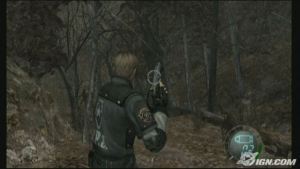
Screen shot of RE4 from IGN.com
It's clearly Autumn when the adventure begins. The sky is grey, the bare trees look skeletal and there are brown leaves piled up on the forest floor. Creepy looking crows caw from sign posts. I've always thought crows were creepy birds. They've got a history of being associated with horror films.
Perhaps the attached image demonstrates the autumnal feel of the game (I couldn't find one that included the crows).
The scene outside my house at present looks very much like the opening scenes from RE4. The sky is grey, the trees are bare and skeletal looking, and brown leaves scatter the ground. We even have creepy-looking crows lurking around, emitting their ominous 'caws'. I don't like Autumn at the best of times. I like it even less when stepping outside my house makes me feel like I've stepped into a Resident Evil game. I shall be watching the neighbours very carefully over the next few weeks, alert for any sign of zombie-like behaviour.
Roll on Spring. There are never any zombie films or games set in the cheerful bloom of springtime. We shall all be safe then.











